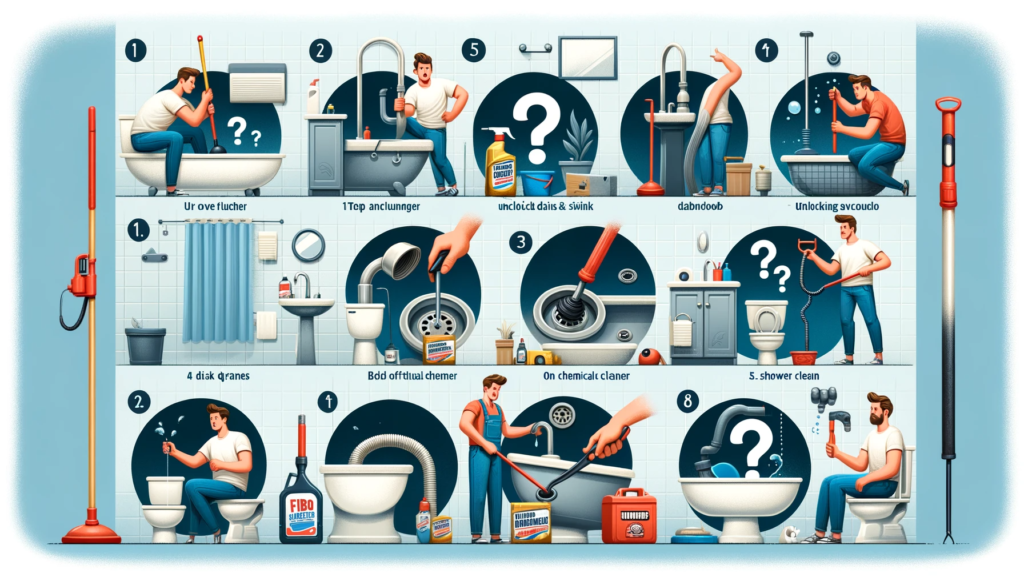Top FAQs on Unclogging Drains and Sinks

Drain and sink clogs can be a frustrating issue that many homeowners, renters, and DIY enthusiasts encounter. The most common causes of these clogs are hair, grease, and food particles. Hair tends to accumulate over time, especially in bathroom drains, leading to blockages. Grease buildup occurs primarily in kitchen sinks due to the improper disposal of cooking oils and fats. Food particles can also contribute to clogs if not properly disposed of or if the garbage disposal is misused.
Fortunately, there are various DIY methods available to tackle these clogs before calling a professional plumber. These methods include using a plunger or creating homemade drain cleaners using natural ingredients. However, it’s important to know when it’s time to seek professional assistance for more complex clogs that cannot be resolved with DIY methods alone.
In the following sections, we will delve deeper into each cause of drain and sink clogs, explore effective DIY methods for unclogging them, discuss when it’s necessary to call a professional plumber, and provide tips on maintaining smooth drains and sinks. Let’s get started!
Common Causes of Drain and Sink Clogs
Hair Clogs
Hair is one of the most common culprits behind drain and sink clogs, especially in bathrooms. When we shower or brush our hair over the sink, loose strands can easily find their way into the drains. Over time, these strands tangle together with soap scum and other debris, forming a stubborn clog.
To minimize hair clogs, there are preventive measures you can take. Consider using a drain strainer or stopper to catch loose hairs before they go down the drain. Regularly clean the strainer or stopper to prevent buildup. Additionally, it’s a good idea to brush your hair before showering or use a detangling spray to reduce the amount of loose hair that ends up in the drain.
Grease Buildup
Grease buildup is a common cause of clogs in kitchen sinks. When cooking oils, fats, and greasy food particles are poured down the drain or washed off dishes, they can solidify inside the pipes over time. This accumulation restricts water flow and eventually leads to clogs.
To prevent grease buildup, avoid pouring cooking oils and fats down the drain. Instead, let them cool and dispose of them in a sealed container in the trash. Wipe greasy dishes with paper towels before washing them to remove excess grease. Regularly clean your sink’s strainer or stopper to prevent any grease from accumulating.
Key Takeaways: By being mindful of these common causes and taking preventive measures, you can significantly reduce the occurrence of drain and sink clogs in your home. In the next section, we will explore effective DIY methods for unclogging drains and sinks that you can try yourself before seeking professional help.
DIY Methods to Unclog Drains and Sinks
Using a Plunger
A plunger is a simple yet effective tool for unclogging drains and sinks. Here’s a step-by-step guide on how to use it:
- Ensure there is enough water in the sink or tub to cover the rubber part of the plunger.
- Place the plunger over the drain, making sure it forms a tight seal.
- Push down firmly and then pull up quickly, creating suction. Repeat this motion several times.
- After a few plunges, remove the plunger and check if the water starts draining. If not, continue plunging until the clog clears.
To maximize your chances of success, here are some tips for effective plunging:
- Use a plunger with a flange or extension for better results in toilets.
- Cover any overflow openings or additional drains with duct tape to create better suction.
- Keep consistent pressure while plunging and avoid breaking the seal between the plunger and drain.
Homemade Drain Cleaner
If you prefer using natural ingredients, homemade drain cleaners can be an excellent alternative to chemical-based products. Here are two recipes you can try:
- Baking Soda and Vinegar:
- Pour 1/2 cup of baking soda down the drain.
- Follow it with 1 cup of vinegar.
- Let it sit for about 30 minutes, then flush with hot water.
- Salt, Borax, and Vinegar:
- Mix 1/4 cup of salt with 1/4 cup of borax.
- Pour this mixture down the drain.
- Follow it with 1/2 cup of vinegar.
- Allow it to sit for at least an hour before rinsing with hot water.
Remember to use these homemade drain cleaners safely by wearing gloves and avoiding contact with your eyes or skin. While these methods can be effective for minor clogs, it’s important to know when it’s time to call a professional plumber. We’ll discuss this further in the next section.
When to Call a Professional Plumber
Signs of Complex Clogs
While many drain and sink clogs can be resolved with DIY methods, there are situations where it’s best to call a professional plumber. Here are some signs that indicate you may be dealing with a complex clog:
- Multiple Drains Are Clogged: If you notice that multiple drains in your home are experiencing slow drainage or complete blockage, it could indicate a more significant issue within your plumbing system.
- Recurring Clogs: If you find yourself frequently dealing with the same clog, even after attempting DIY methods, it’s likely that the underlying cause hasn’t been fully resolved.
- Foul Odors: Persistent foul odors emanating from your drains could suggest a buildup of organic matter or sewage backup, which requires professional attention.
- Gurgling Sounds: Unusual gurgling sounds coming from your drains or toilets when using other fixtures in your home may indicate a problem with your sewer line.
In these situations, it’s important to avoid further attempts at DIY unclogging methods as they may exacerbate the problem or cause damage to your plumbing system. Instead, reach out to a professional plumber who has the expertise and tools to diagnose and resolve complex clogs effectively.
Choosing a Reliable Plumber
When selecting a professional plumber, consider the following factors:
- Licensing and Insurance: Ensure that the plumber is licensed and insured to protect yourself against any potential liabilities during the repair process.
- Experience and Expertise: Look for plumbers with extensive experience in handling various types of plumbing issues, including drain and sink clogs.
- Reputation and Reviews: Read customer reviews and testimonials to gauge the plumber’s reputation for quality workmanship and customer satisfaction.
- Pricing and Estimates: Request detailed estimates from multiple plumbers before making a decision. Be cautious of unusually low prices as they may indicate subpar service or hidden costs.
- Availability and Response Time: Choose a plumber who can accommodate your schedule and respond promptly in case of emergencies.
Before hiring a plumber, don’t hesitate to ask questions about their qualifications, warranties, and guarantees. By choosing a reliable professional, you can have peace of mind knowing that your drain or sink clog will be handled efficiently and effectively.
Maintaining Smooth Drains and Sinks
To keep your drains and sinks running smoothly, regular maintenance is key. Here are some tips to help you prevent clogs and maintain a healthy plumbing system:
- Perform routine maintenance by flushing your drains with hot water regularly. This helps clear away any accumulated debris and prevents buildup.
- Avoid pouring grease, oil, or fat down the drain. Instead, let them cool and dispose of them in the trash.
- Use drain strainers or stoppers to catch hair, food particles, and other debris before they enter the drain.
- Clean your sink’s strainer or stopper regularly to prevent any buildup that could lead to clogs.
- Avoid using chemical drain cleaners as they can be harsh on your pipes and harmful to the environment. Opt for natural homemade drain cleaners instead.
By following these simple maintenance practices and being mindful of what goes down your drains, you can significantly reduce the occurrence of clogs and keep your drains and sinks clean and functional for years to come.
Remember, if you encounter complex clogs that cannot be resolved with DIY methods or if you’re unsure about tackling a plumbing issue yourself, don’t hesitate to call a professional plumber. They have the expertise to handle more challenging situations and ensure the proper functioning of your plumbing system.




